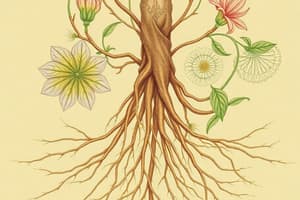Podcast
Questions and Answers
What is the main focus of plant physiology?
What is the main focus of plant physiology?
- The functions and processes of plants (correct)
- The classification and naming of plants
- The internal structure of plants
- The relationships between plants and their environments
Which of the following describes a key characteristic of vascular plants?
Which of the following describes a key characteristic of vascular plants?
- They consist of flowering and non-flowering types (correct)
- They are exclusively found in aquatic environments
- They reproduce only through asexual methods
- They do not have specialized tissues
What is a significant aspect of plant ecology?
What is a significant aspect of plant ecology?
- Interactions between plants and their environments (correct)
- Genetic modifications in plants
- Classification of plant species
- The study of plant structure
Which process is primarily responsible for converting light energy into chemical energy in plants?
Which process is primarily responsible for converting light energy into chemical energy in plants?
What does plant taxonomy study?
What does plant taxonomy study?
Which is an example of a structural adaptation in plants?
Which is an example of a structural adaptation in plants?
What aspect of botany examines the relationship between people and plants?
What aspect of botany examines the relationship between people and plants?
In which career would a person most likely engage in research about plant diseases?
In which career would a person most likely engage in research about plant diseases?
Flashcards are hidden until you start studying
Study Notes
Overview of Botany
- Botany is the scientific study of plants, encompassing their structure, properties, and biochemical processes.
- It is a branch of biology focused on understanding plant life.
Major Branches of Botany
-
Plant Anatomy
- Studies the internal structure of plants.
- Key components: tissues (dermal, vascular, ground) and organs (roots, stems, leaves).
-
Plant Physiology
- Focuses on the functions and processes of plants.
- Key processes: photosynthesis, respiration, transpiration, and nutrient uptake.
-
Plant Taxonomy
- The classification and naming of plants.
- Hierarchical system includes domain, kingdom, phylum, class, order, family, genus, and species.
-
Plant Ecology
- Examines the relationships between plants and their environments.
- Studies plant distribution, abundance, and interactions with other organisms.
-
Plant Genetics
- Investigates heredity and variation in plants.
- Includes studies on plant breeding, genetic modification, and evolution.
-
Ethnobotany
- Explores the relationship between people and plants.
- Focuses on traditional plant use in medicine, food, and culture.
Important Concepts
-
Photosynthesis
- Process by which plants convert light energy into chemical energy (glucose).
- Involves chlorophyll, sunlight, carbon dioxide, and water.
-
Plant Classification
- Plants are classified into two main groups: vascular (with vessels) and non-vascular (without vessels).
- Vascular plants include flowering plants (angiosperms) and non-flowering plants (gymnosperms).
-
Plant Reproduction
- Asexual reproduction (e.g., cuttings, runners) and sexual reproduction (through seeds).
- Flower structure: sepals, petals, stamens (male), and carpels (female).
-
Plant Adaptations
- Structural adaptations (e.g., thorns, waxy leaves).
- Physiological adaptations (e.g., drought resistance, CAM photosynthesis).
Importance of Botany
- Critical for food production, pharmaceuticals, and ecological balance.
- Essential for conservation and understanding biodiversity.
- Plays a role in addressing environmental issues, such as climate change and habitat loss.
Career Opportunities
- Botanist, horticulturist, plant pathologist, ecologist, or conservation biologist.
- Opportunities in research, education, agriculture, and environmental management.
Overview of Botany
- Botany is the scientific study of plants, focusing on their structures, properties, and biochemical processes.
- It is a key branch of biology that aims to understand plant life and its significance.
Major Branches of Botany
-
Plant Anatomy
- Investigates the internal structure of plants, including three main tissue types: dermal, vascular, and ground.
- Analyzes plant organs such as roots, stems, and leaves to understand their functions.
-
Plant Physiology
- Explores how plants function and the processes that sustain their life.
- Key processes include:
- Photosynthesis: conversion of light energy into chemical energy (glucose).
- Respiration: the process of breaking down glucose for energy.
- Transpiration: the movement of water vapor from plant surfaces.
- Nutrient uptake: absorption of essential minerals from the soil.
-
Plant Taxonomy
- Focuses on the classification and nomenclature of plants.
- Uses a hierarchical system: domain, kingdom, phylum, class, order, family, genus, and species.
-
Plant Ecology
- Studies the interaction between plants and their environments.
- Examines aspects like plant distribution, proliferation, and relationships with other organisms.
-
Plant Genetics
- Investigates heredity and genetic variation in plants.
- Involves studies on plant breeding techniques, genetic modification, and evolutionary processes.
-
Ethnobotany
- Explores the connection between humans and plants.
- Investigates traditional uses of plants in medicine, nutrition, and cultural practices.
Important Concepts
-
Photosynthesis
- Converts light energy into chemical energy using chlorophyll, sunlight, carbon dioxide, and water.
-
Plant Classification
- Plants categorized into:
- Vascular plants: possess vascular tissues (e.g., angiosperms and gymnosperms).
- Non-vascular plants: lack vascular tissues.
- Plants categorized into:
-
Plant Reproduction
- Asexual reproduction methods include cuttings and runners.
- Sexual reproduction occurs through seeds, with flower structures consisting of sepals, petals, stamens (male), and carpels (female).
-
Plant Adaptations
- Structural adaptations, such as thorns and waxy leaves, help plants survive in various environments.
- Physiological adaptations include drought resistance and CAM (Crassulacean Acid Metabolism) photosynthesis.
Importance of Botany
- Essential for food production, pharmaceuticals, and maintaining ecological balance.
- Vital for conservation efforts and understanding biodiversity.
- Contributes to addressing environmental challenges like climate change and habitat loss.
Career Opportunities
- Positions include botanist, horticulturist, plant pathologist, ecologist, and conservation biologist.
- Opportunities exist in research, education, agriculture, and environmental management fields.
Studying That Suits You
Use AI to generate personalized quizzes and flashcards to suit your learning preferences.




